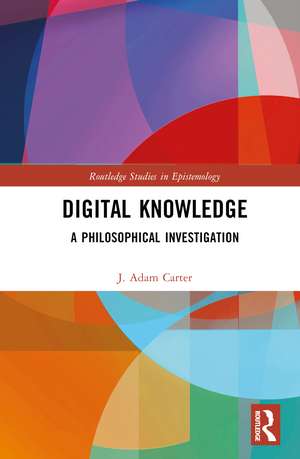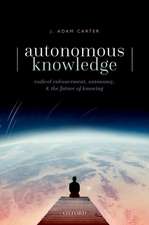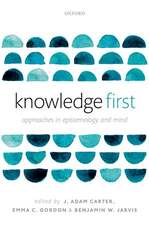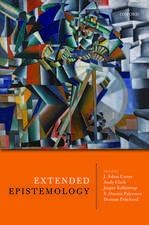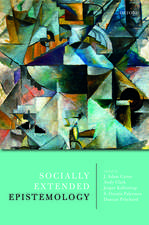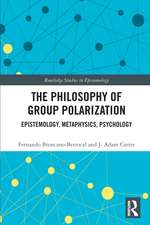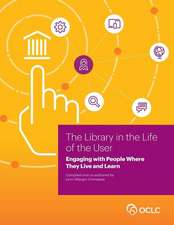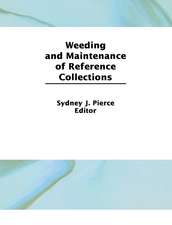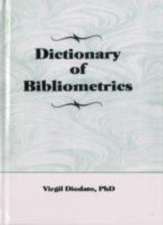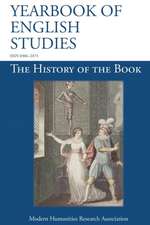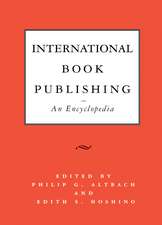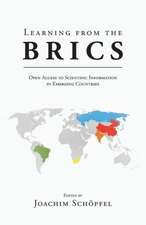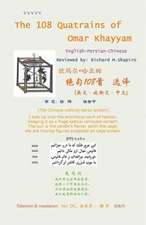Digital Knowledge: A Philosophical Investigation: Routledge Studies in Epistemology
Autor J. Adam Carteren Limba Engleză Hardback – 31 ian 2024
Digital Knowledge: A Philosophical Investigation is the first book to squarely and rigorously investigate digital knowledge: what it is, how to make sense of it in connection with received theories of knowledge, and where it is going. Key questions J. Adam Carter examines along the way are the following:
- How is mere digital information converted into reliable digital knowledge?
- To what extent can digital knowledge be vindicated against sceptical challenges, and in what ways might digital knowledge stand distinctively subject to defeat?
- What is the epistemically optimal way for us to decide which tasks to outsource entirely to intelligent machines, and to what extent is further outsourcing appropriate (or not) to verify the results of that same outsourced cognition?
- Are there any ways in which the expansion of the datasphere threatens to make knowledge less, rather than more, easy to come by? If so, are there any promising ways to safeguard, epistemically, against such threats?
Din seria Routledge Studies in Epistemology
-
 Preț: 312.12 lei
Preț: 312.12 lei -
 Preț: 311.56 lei
Preț: 311.56 lei -
 Preț: 310.75 lei
Preț: 310.75 lei -
 Preț: 381.77 lei
Preț: 381.77 lei - 18%
 Preț: 1001.84 lei
Preț: 1001.84 lei -
 Preț: 387.91 lei
Preț: 387.91 lei -
 Preț: 386.61 lei
Preț: 386.61 lei - 9%
 Preț: 937.50 lei
Preț: 937.50 lei -
 Preț: 389.31 lei
Preț: 389.31 lei -
 Preț: 389.66 lei
Preț: 389.66 lei -
 Preț: 386.81 lei
Preț: 386.81 lei - 18%
 Preț: 1003.93 lei
Preț: 1003.93 lei - 18%
 Preț: 1007.36 lei
Preț: 1007.36 lei -
 Preț: 381.00 lei
Preț: 381.00 lei -
 Preț: 386.39 lei
Preț: 386.39 lei -
 Preț: 389.66 lei
Preț: 389.66 lei -
 Preț: 401.21 lei
Preț: 401.21 lei - 17%
 Preț: 257.68 lei
Preț: 257.68 lei -
 Preț: 389.66 lei
Preț: 389.66 lei - 18%
 Preț: 1000.27 lei
Preț: 1000.27 lei -
 Preț: 389.70 lei
Preț: 389.70 lei -
 Preț: 382.95 lei
Preț: 382.95 lei -
 Preț: 393.90 lei
Preț: 393.90 lei - 18%
 Preț: 1002.50 lei
Preț: 1002.50 lei -
 Preț: 386.18 lei
Preț: 386.18 lei - 18%
 Preț: 1011.96 lei
Preț: 1011.96 lei - 17%
 Preț: 271.61 lei
Preț: 271.61 lei - 9%
 Preț: 935.88 lei
Preț: 935.88 lei - 18%
 Preț: 1004.55 lei
Preț: 1004.55 lei - 18%
 Preț: 1004.24 lei
Preț: 1004.24 lei - 18%
 Preț: 1000.27 lei
Preț: 1000.27 lei
Preț: 1000.27 lei
Preț vechi: 1219.84 lei
-18% Nou
Puncte Express: 1500
Preț estimativ în valută:
191.40€ • 200.34$ • 159.31£
191.40€ • 200.34$ • 159.31£
Carte tipărită la comandă
Livrare economică 31 martie-14 aprilie
Livrare express 22-28 februarie pentru 33.86 lei
Preluare comenzi: 021 569.72.76
Specificații
ISBN-13: 9780367566913
ISBN-10: 0367566915
Pagini: 206
Ilustrații: 3 Tables, black and white; 3 Line drawings, black and white; 3 Illustrations, black and white
Dimensiuni: 156 x 234 x 20 mm
Greutate: 0.45 kg
Ediția:1
Editura: Taylor & Francis
Colecția Routledge
Seria Routledge Studies in Epistemology
Locul publicării:Oxford, United Kingdom
ISBN-10: 0367566915
Pagini: 206
Ilustrații: 3 Tables, black and white; 3 Line drawings, black and white; 3 Illustrations, black and white
Dimensiuni: 156 x 234 x 20 mm
Greutate: 0.45 kg
Ediția:1
Editura: Taylor & Francis
Colecția Routledge
Seria Routledge Studies in Epistemology
Locul publicării:Oxford, United Kingdom
Public țintă
Postgraduate and Undergraduate AdvancedCuprins
Preface 1. Digital Epistemology: A Research Programme Motivated 2. From Digital Information to Digital Knowledge 3. The Nature of Digital Knowledge: A Bi-Level Account 4. The Dark Side of Digital Knowledge: Scepticism and Defeat 5. A Digital Epistemology of Machine Learning 6. A Digital Epistemology of Big Data. Bibliography Index
Notă biografică
J. Adam Carter is Professor of Philosophy at the University of Glasgow, UK, where he is the deputy director of the COGITO Epistemology Research Centre. His books The Philosophy of Group Polarization and The Epistemology of Group Disagreement (both with Fernando Broncano-Berrocal), and Well-Founded Belief: New Essays on the Epistemic Basing Relation (with Patrick Bondy), are also available from Routledge. He is also the author of Autonomous Knowledge (2022) and PI on an AHRC-funded project on digital epistemology (2022–2025).
Descriere
Digital Knowledge: A Philosophical Investigation is the first book to fully explain and examine digital knowledge: what it is, how it compares to received theories of knowledge and where it is going.
